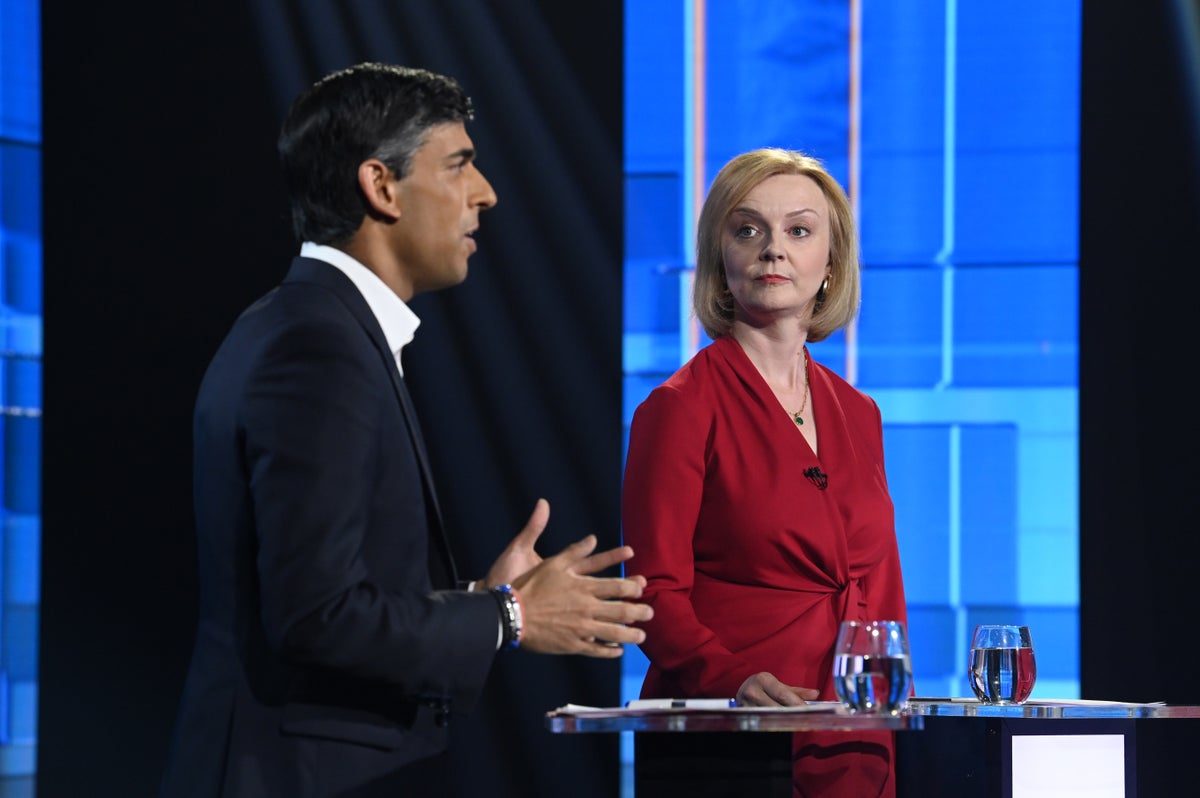
The £30bn tax-slashing plans of Liz Truss have been savaged by economists, who are warning they will fuel inflation and risk a return to austerity while busting Treasury rules.
The Tory leadership race favourite was dragged into a damaging row about the credibility of her strategy after she argued it would tame soaring inflation – turning economic orthodoxy on its head.
One economics professor told The Independent the claim was “ridiculous”, while the respected Institute for Fiscal Studies went further, also highlighting the danger for public services and spending rules.
The row came as Rishi Sunak rejected bringing forward his 1p income tax cut – announced for spring 2024 – to woo Tory members away from Ms Truss, and underline his “fiscal responsibility” credentials.
The IFS concluded Ms Truss’s proposals would “likely result in the current fiscal rules being broken”, requiring borrowing for day-to-day spending and leaving debt still rising at the next election.
The think tank warned of a “deterioration in the quality” of public services if, as she has suggested, Ms Truss puts tax cuts ahead of protecting services against rising inflation in her emergency autumn budget.
The damning verdict came as the foreign secretary appeared to be coasting to victory in the contest, securing a yawning 24-point lead over her rival Mr Sunak in a poll of Tory members.
On the campaign trail in Peterborough, Ms Truss doubled down on her plans, rejecting the IFS warning that she would break fiscal rules and insisting her tax cuts were “affordable”.
She signalled her readiness to make cuts if necessary, saying: “When I was a Treasury minister, I was in charge of public spending. I controlled public spending effectively.”
Earlier, in her first major campaign interview, the foreign secretary raised eyebrows by telling BBC Radio 4: “My tax cuts will decrease inflation.”
The package includes reversing the national insurance rise to fund the NHS (annual cost £13bn), scrapping the planned hike in corporation tax from 19 per cent to 25 per cent (£17bn), waiving the green levy on energy bills (cost unknown) and more help for carers to take time off work (cost unknown).
Ms Truss dismissed the “consensus of the Treasury, of economists”, accusing them of “peddling a particular type of economic policy for 20 years” that “hasn’t delivered growth”.
“What people in Britain desperately need now is change. We need to unleash investment in our country,” the candidate insisted, arguing that her tax cuts would boost “the supply side of the economy”.
“The reason we have inflation is it’s a supply shock, combined with a slightly loose monetary policy over time,” Ms Truss said, adding of her strategy: “It’s not a gamble.”
But Dr Jo Michell, associate professor of economics at UWE Bristol, told The Independent: “The tax cuts she’s proposing are more likely to be inflationary so, on balance of probability, her comments are false.
“It’s certainly a gamble. Saying the plan has no risk [of increasing inflation] is ridiculous.”
Frances Coppola, a financial economist and writer, warned of a strong likelihood that the plans would “backfire” and damage the economy, saying: “These tax cuts are likely to be inflationary in the short-term.”
She likened the situation to Edward Heath’s “dash for growth”, blamed for runaway inflation in the 1970s, adding: “Liz Truss is using exactly the same argument – that inflation will fix itself if we get the economy growing.”
Mr Sunak added his own criticism, agreeing that such tax cuts would be “inflationary”, telling LBC Radio: “If the government goes on a huge borrowing spree, that is only going to make the situation worse.”
The former chancellor has admitted he is the outsider in the battle for No 10, despite winning the support of 137 Conservative MPs, a sizeable lead on the foreign secretary’s 113.
As well as the tax cuts row, he is vulnerable to the anger of some Tory members that he helped trigger Boris Johnson’s departure – by resigning – while Ms Truss stood by him.
And his reputation has not fully recovered from the controversy over his wife’s non-dom tax status, or the revelation he had a US green card while he was chancellor.
In his interview, Mr Sunak struggled to back up his claim to the Thatcherite mantle, pointing to his freeports idea as an example of radicalism that could match hers.
He said it would be “a priority” to make the controversial Rwanda deportations policy work, alongside appointing a new ethics adviser after the prime minister refused to fill the post.
And he sought to exploit his greater popularity with the general public, claiming: “If you look at all polling evidence, it’s pretty clear that I am the best person to defeat Sir Keir Starmer.”







